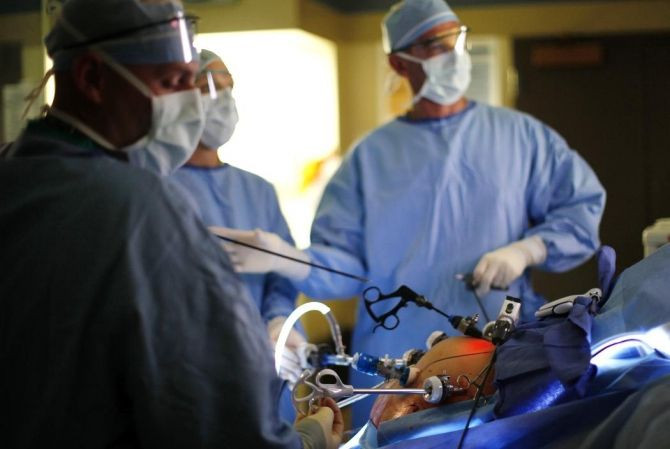Weight-Loss Surgery Cuts Blood Sugar and Treats Diabetes More Effectively than Drugs

Weight-loss surgery was more effective at controlling type II diabetes in overweight and moderately obese patients than traditional medical therapy, according to findings from two new studies.
The latest findings suggest that stomach-reducing operations, which was found to help significantly more patients achieve normal blood-sugar levels than prescription medicine, may reverse and possible cure diabetes and researchers recommend that weight loss procedures it should be offered sooner to more people with the disease.
Researchers said that most of the bariatric surgery patients showed lower blood sugar levels immediately after the operations and were able to stop taking all diabetes medications and maintain disease remission for the two-year study period, compared none of those who were randomly assigned to receive standard medical treatment.
Researchers compared patients who took traditional diabetes medication to those who underwent gastric bypass operations that reduce stomach volume by 75 percent and others who had a more aggressive operation called biliopancreatic diversion operations that removes about 80 percent of the stomach and bypasses most of the intestines to reduce the amount of food absorption in the intestines.
One of the studies by researchers at the Cleveland Clinic studied 150 obese patients with uncontrolled type II diabetes, and found that 42 percent of gastric bypass patients, 37 percent of sleeve gastrectomy patients had normal blood sugar levels a year later, compared to only 12 percent of patients on drugs. Researchers in this study said while glycemic control improved in all three groups, improvements were significantly greater in surgical groups, including weight loss, and insulin resistance.
Researchers in the Cleveland Clinic, sponsored by Johnson & Johnson, which makes surgical staples, noted that while four patients required re-operations, there were no deaths or life-threatening complications.
The second study from researchers at Università Cattolica del Sacro Cuore in Rome and New York Presbyterian Hospital in Manhattan found better results in a smaller study consisting of 60 obese patients with advanced diabetes. About 75 percent of gastric bypass patients and 95 percent of bilopancreatic diversion patients were in remission two years later.
"These findings confirm that the effects of bariatric surgery on type 2 diabetes may be attributed to the mechanisms of surgery rather than the consequences of weight loss," Dr. Geltrude Mingrone said in chief of the Division of Obesity and Metabolic Diseases and professor of medicine at Catholic University in Rome, Italy, said in a statement released on Monday. "Studying the actual mechanisms by which surgery improves diabetes may help understand the disease better."
Researchers also noted that because most patients who underwent surgical operations had lower cholesterol, or improvement in blood glucose and lipid profile, the findings suggest that the operations may also lower cardiovascular risk.
Senior author Dr. Francesco Rubino of the New York-Presbyterian and Weill Cornell Medical College in New York City said that while bariatric surgery was initially intended as a treatment for weight loss, the latest findings show that obesity surgical operations are an “excellent approach” for treating diabetes and metabolic diseases.
Both of the studies were published online by the New England Journal of Medicine, and the Cleveland Clinic research paper was presented Monday at an American College of Cardiology conference in Chicago.
More than a third of adults in the United States are obese, and more than eight percent have diabetes, a disease that causes heart disease and strokes, and about five to ten million of people have both diabetes and weight conditions.
While doctors have traditionally treated diabetes with pills and insulin, and encouraged weight loss and exercise with limited success, very few obese patients lose enough pounds without surgery and many of the drugs used to treat diabetes can cause weight gain.
"For about a century, we have been treating diabetes with pills and injections and this is one of the first studies to show that surgical therapy may, at least in some patients, be much more effective than the polypharmacy approach to treating this disease," the Cleveland Clinic lead investigator Dr. Philip Schauer said in a statement. "It's a potential paradigm change. In patients with moderate to severe diabetes, medication therapy alone can only get them so far; they are often still well above the target of good glycemic control."
Schauer noted that weight loss surgery had risks, and the most common side effects were short-term dehydration, bleeding and one leak.
Surgery generally costs about $15,000 to $25,000, and Medicare covers it for diabetic patients who are very obese.
Researchers said that even in light of the potential gains of surgery, only a few can access it and the barriers are substantial. They say only two percent of eligible patients have access to bariatric/metabolic surgery in the U.S., and that the rate is even lower in the world.
Other experts say that while the findings were encouraging for people who were very obese and had diabetes the disease can be controlled though less drastic measures, and that the long-term outcomes of weight loss surgeries and whether the benefits are will last are still unknown.
Others were more optimistic and believe that the findings could revolutionize future diabetes treatment.
The studies "are likely to have a major effect on future diabetes treatment," two experts from Australia, Dr. Paul Zimmet and George Alberti, wrote in an editorial in the medical journal. Surgery "should not be seen as a last resort" and should be provided earlier in treating obese people with diabetes, the authors wrote.
Published by Medicaldaily.com



























